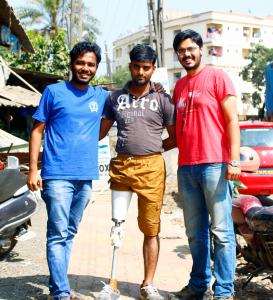
The Jaipur Foot, developed by R.C. Sharma and Dr. P.K. Sethiat Bhagwan Mahavir Viklang Sahayata Samiti, Jaipur in 1968, has benefitted over half million lower-limb amputees around the world. The process relies on low-cost materials and manual skills, and has remained relatively unchanged over the last five decades.
Ratna Nidhi Charitable Trust, an NGO based in Mumbai, have provided over 20,000 prosthetic limbs to poor patients free of cost, using the conventional Jaipur Foot process. They approached Biomedical Engineering & Technology incubation Centre (BETiC) in IIT Bombay to improve the prosthesis quality and productivity, while maintaining similar levels of cost and skill-set.
The BETiC team evolved a new design that incorporates a knee joint developed at IIT Madras, allowing above-knee amputees to walk more naturally. A new process was evolved for creating patient-specific sockets (to exactly fit their residual stumps) using parametric CAD, and fabricating them twice as fast using a combination of 3D printing and CAM (computer-aided machining). The new design and process were successfully tested on a few volunteers, who reported better mobility and reduced discomfort. Further studies are underway at the Centre for Human Movement Sciences in MGM Institute of Health Sciences, Navi Mumbai.
Our team won the coveted Google Impact Challenge Award for Disabilities in 2016, allowing RNCT to set up a dedicated fabrication centre, which will be used to provide up to 1000 free prosthetic limbs to poor patients over the next few months.
Prof. B Ravi
